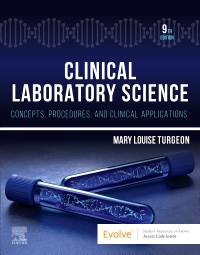
Clinical Laboratory Science - Elsevier eBook on VitalSource, 9th Edition
Elsevier eBook on VitalSource

Using a discipline-by-discipline approach, Turgeon’s Clinical Laboratory Science: Concepts, Procedures, and Clinical Applications, 9th Edition, provides a fundamental overview of the concepts, procedures, and clinical applications essential for working in a clinical laboratory and performing routine clinical lab tests. Coverage includes basic laboratory techniques and key topics such as safety, phlebotomy, quality assessment, automation, and point-of-care testing, as well as discussion of clinical laboratory specialties. Clear, straightforward instructions simplify laboratory procedures and are guided by the latest practices and CLSI (Clinical and Laboratory Standards Institute) standards. Written by well-known CLS educator Mary Louise Turgeon, this edition offers essential guidance and recommendations for today’s laboratory testing methods and clinical applications.
-
- NEW! Content spans traditional principles and practices to the expanding applications of molecular diagnostics that reflect the most current clinical laboratory practices and technology
- NEW! New Frontiers in Molecular Diagnostics chapter explores the future of the field
- NEW! Coverage of the "new face" of clinical laboratory practice recognizes of the important need for laboratories for SARS-CoV-2 testing during the COVID-19 pandemic, with an increased emphasis on safety, patient considerations, and delivery of testing modes
- NEW! Exploration of current laboratory safety issues, strategies, and the need for various safety-related officers to control problems such as supply chain interruptions and the risk of infection from aerosols
- NEW! Applications of innovative quality models, such as clinical outcomes and biological variation, improve the acceptable standards of laboratory testing and the interpretations of reference ranges
- NEW! Expanded information on new oral anticoagulants is presented along with the appropriate laboratory testing, with alternative testing added to the discussion of blood coagulation
- NEW! Increased focus on cell types in cerebrospinal fluid includes descriptions of associated clinical disorders and microbial examination
- NEW! Expanded comparisons of the characteristics of important body fluids, such as synovial fluid, serous fluids, seminal fluid, and amniotic fluid.
- NEW! Appendix offers comprehensive overview of COVID-19
- NEW! Educator resources on Evolve include additional visual modules, such as Laboratory Safety in the Era of COVID-19 and An Overview: SARS-CoV-2 Pandemic
- Broad scope of coverage makes this text an ideal companion for clinical laboratory science programs at various levels, including CLS/MT, CLT/MLT, medical laboratory assistant, and medical assisting, and reflects the taxonomy levels of the CLS/MT and CLT/MLT exams
- Detailed procedure guides and procedure worksheets on Evolve and in the ebook familiarize students with the exact steps performed in the lab
- Vivid, full-color illustrations depict concepts and applicable images that can be seen under the microscope
- An extensive number of certification-style, multiple-choice review questions are organized and coordinated under major topical headings at the end of each chapter to help assess students’ understanding and identify areas requiring additional study.
- Case studies include critical thinking group discussion questions, providing the opportunity to apply content to real-life scenarios
- The newest Entry Level Curriculum Updates for workforce entry, published by the American Society for Clinical Laboratory Science (ASCLS) and the American Society for Clinical Pathology (ASCP) Board of Certification Exam Content Outlines, serve as content reference sources
- Convenient glossary makes it easy to look up definitions without having to search through each chapter
- An Evolve companion website provides convenient access to animations, flash card sets, and additional review questions
- Experienced author, speaker, and educator Mary L. Turgeon is well known for providing insight into the rapidly changing field of clinical laboratory science
-
- NEW! Content spans traditional principles and practices to the expanding applications of molecular diagnostics that reflect the most current clinical laboratory practices and technology
- NEW! New Frontiers in Molecular Diagnostics chapter explores the future of the field
- NEW! Coverage of the "new face" of clinical laboratory practice recognizes of the important need for laboratories for SARS-CoV-2 testing during the COVID-19 pandemic, with an increased emphasis on safety, patient considerations, and delivery of testing modes
- NEW! Exploration of current laboratory safety issues, strategies, and the need for various safety-related officers to control problems such as supply chain interruptions and the risk of infection from aerosols
- NEW! Applications of innovative quality models, such as clinical outcomes and biological variation, improve the acceptable standards of laboratory testing and the interpretations of reference ranges
- NEW! Expanded information on new oral anticoagulants is presented along with the appropriate laboratory testing, with alternative testing added to the discussion of blood coagulation
- NEW! Increased focus on cell types in cerebrospinal fluid includes descriptions of associated clinical disorders and microbial examination
- NEW! Expanded comparisons of the characteristics of important body fluids, such as synovial fluid, serous fluids, seminal fluid, and amniotic fluid.
- NEW! Appendix offers comprehensive overview of COVID-19
-
Part I Basic Laboratory Techniques
1. Fundamentals of the Clinical Laboratory
2. Safety: Patient and Clinical Laboratory Practices
3. Quality Assessment and Quality Control in the Clinical Laboratory
4. The Microscope
5. Systems of Measurement, Laboratory Equipment, and Reagents
6. Laboratory Mathematics and Solution Preparation
7. Basic and Contemporary Techniques in the Clinical Laboratory
8. Laboratory Testing: From Point of Care to Total Automation
Part II Basic Clinical Laboratory Specializations
9. Phlebotomy: Collecting and Processing Patient Blood Specimens
10. An Introduction to the Principles and Practice of Clinical Hematology
11. Hemostasis and Blood Coagulation
12. Renal Physiology and Urinalysis
13. Examination of Body Fluids and Miscellaneous Specimens
14. Introduction to the Principles and Practice of Clinical Chemistry
15. New Frontiers in Molecular Diagnostics
16. Introduction to Medical Microbiology
17. Immunology and Serology
18. Immunohematology and Transfusion Medicine
Appendix
A: Answers to Review Questions and Case Studies
B: AMA Recognized Disease/Organ Panels
C: Periodic Table
D: Overview of COVID-19
E: Molecular Testing Methods
F Quick Calculations and Adult Reference Values


 as described in our
as described in our 